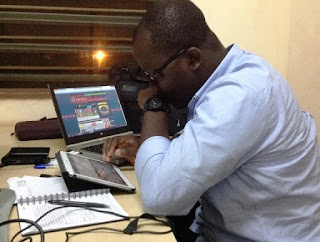 |
| Referee Seidu Bomison in action at a league venue. |
The uncertainty and near state
of hopelessness that have clouded the domestic football landscape seems to be a
perfect climax to a year that saw not only Kumasi Asante Kotoko but also our
arch rivals Hearts of Oak struggling for Premier League survival. Events for
the two most popular clubs took a downward spiral, causing massive
disappointments for Kotoko and Hearts fans.
Although the two teams eventually
survived the turmoil especially with relegation, the dust appears not to have
settled properly on that loathsome Kotoko-Hearts-Obed Owusu protest. As a
journalist with Kotoko, I probably don’t have to be concerned if the review of
the judgement by the Appeals Committee, sought by Hearts hasn’t seen any
illumination by the GFA.
I perhaps don’t have to be
interested in how that case finally ends because after all, Kotoko got the vexatious
Disciplinary Committee ruling that docked the club six points overturned.
Indeed, I would have cared less if I didn’t have interest in the domestic
league. I would have of course spent no energy on my sickbed revisiting this
matter.
I don’t expect Hearts to
secure what they are looking for concerning this case. I don’t even believe they
would get judgement turned in their favour. As I said in a radio interview sometime
back, although Hearts’ apologists didn’t admit, the ultimate aim of that
exasperating ruling by the Disciplinary Committee, was to offer Hearts, then
caught neck deep in the relegation battle, some respite if not the impetus to confront
their last two decisive matches.
Thankfully, that objective was
achieved so why are they so bent on having the very lucid judgment of the
Appeals Committee reviewed? Whatever the outcome of that case will be, its
handling adds to the confusing and almost inept management of the domestic
league this year.
As someone with a passion for
our local game, the present situation, where we don’t know when the 2015/16
season will start, isn’t only boring. It also raises questions about how and
when we will see an end to this type of deadlock, not seen in any
well-administered football league. I wouldn’t have been writing this way if
this was the first time such a thing was happening.
Prior to the start of the
2014/15 season, we were subjected to this painful ordeal of having to wait so
long to pursue what brings us joy when it comes to domestic football. Whatever
has brought us to this point, and I hate to interrogate it, may have its own
merits but the fact that, we are back at experiencing what caused so much
disaffection between the Ghana Football Association (GFA) and local football
fans in 2014, tells me we have learnt nothing.
As I have written in previous
articles, I don’t want to be seen as constantly criticizing the GFA because my
conviction is that, the FA, regardless of the often harsh criticism and habitually
unfair bashing it receives, isn’t a hopeless, visionless establishment as some
want us to see it. They have been up to some good and constructiveness except
that, their management of the domestic league has recently left so much to be
desired.
An example of the useful
things the GFA has been up to is the media and marketing seminar they are
organizing this week for club administrators. As an advocate of good management
and administrative practices in our football, it’s only fair that, I pat the
GFA on their back for that initiative.
Irrespective of how dull the
domestic football scene has looked lately as a result of the boring inactivity,
the congregation of administrators, media and venue officers at a two-day
seminar on the much talked about club licensing programme, marketing and sponsorship
– to essentially build capacity – in fact, access knowledge on what they may
not know, isn’t a bad scheme.
Whether it’s coming as an
after-thought or a planned programme, the importance of the event taking place
at the Alisa Hotel in Accra can’t be downplayed. It’s good, but GFA, please, get the season back, for those with a thirst for domestic football
action are suffering.















